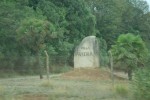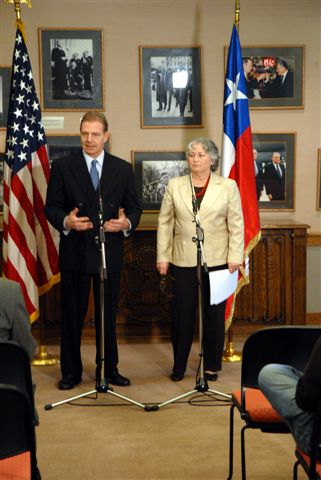SEARCHING FOR BORIS WEISFEILER: SEQUENCE OF EVENTS
2023.JUSTICE DENIED
The appeal to the Supreme Court was rejected. In an unusual split decision of 3 to 2, justice for Boris Weisfeiler was denied once again.
Ministers Valderrama, Simpértigue, and Gajardo considered that the crime of Boris Weisfeiler's kidnapping and forced disappearance was "prescribed," based on the agents of the State's apparent belief that the person they were looking for was an extremist. The ruling justified baseless beliefs and ignored the fact that Boris presented them with a plethora of documentation, including a US passport, Pennsylvania-issued driver's license, stamped paper from Penn State acknowledging that B.W. was a Math Professor there, and an entry visa issued on December 25, 1984, just nine days prior, at the Arturo Merino Benítez International Airport.
While admitting that Boris was a forced disappearance, the Justices wrongly applied the statute of limitation to the forced disappearance crime, despite years of jurisprudence referring to these crimes, excluding such crimes from that clause, as forced disappearances are an ongoing crime until the person is no longer disappeared. Thus reinforcing the denial of justice and denying relief for the family.
While marking the 50th anniversary of Pinochet's coup, the Chilean State is grappling with denialism at all levels of Chilean society: Government, Judiciary, and Human Rights crimes recognition. The military cover-ups still continue. Sexually committed crimes are painstakingly slowly recognized and/or investigated. Forensic investigations are almost nonexistent. Such spread of denialism and the damage it inflicts on society were discussed on November 8, 2023, at the Inter-American Commission on Human Rights (IACHR) in Washington D.C.: "Chile: Memory, Truth, and Justice, 50 Years After the Beginning of the Civil-Military Dictatorship." There, at the IACHR hearing, members of the Commission and the representatives of the State discussed the possible and proposed actions to fight such widespread denialism, including the proposed search for the disappeared. Boris' case was raised during the IACHR hearing as a poignant example, with those present forced to see an actual family of victims struggling, and not just as some theoretical points of discussion.
Sadly Boris Weisfeiler's case of kidnapping, forced disappearance, and apparent murder is a vivid example of State of Chile denialism.
2023.THE SUPREME COURT TO HEAR THE ARGUMENTS
On May 4, 2023, more than 3 years after our appeal was filed, the Second Chamber of the Supreme Court heard Boris's case. Hernan Fernandez, the Weisfeiler family's attorney, Joaquin Perera from the Human Rights Program, and Ricardo Gonzales from the State Defense Council made their cases before the Second Chamber. Joaquín Perera presented his arguments first, followed by Hernán Fernandez, and Ricardo González closed.
On the second day of the hearing on May 5, two defense attorneys representing military members involved in Boris's kidnapping and disappearance presented their arguments. No defense attorney represented the four Carabineros involved in the case.
It could take months before the Court's decision will be announced.
2019. THE TRAVESTY OF JUSTICE IN CHILE: CONFIRMED!
Twenty years past since Boris' disappearance case was reopened in the Chilean Courts: 20 years of judicial investigations and processings. No new discoveries or findings ever were found. No given an explanation of what happened to Boris after 'abduction' or where his body might be... or no admitting that it was made disappeared.
On November 18 the Chilean Court of Appeals upheld the legitimacy of judge Zepeda's ruling: that basically said the military Boris's kidnapping, murder, and disappearance were lawful.
And that was despite all of that ruling's contradictions and shortcomings. And despite the legal adviser's, appointed by the same court, report which pointed out to those shortcomings and absence of legitimacy of Zepeda's ruling: "2016. The legal advisor of the Court of Appeals, who has the rank of a Minister (judge), issued her opinion that Zepeda's sentence did not respect the basic principles of the ruling process, meaning: 1- He did not describe the facts of the case appropriately. 2- He did not explain with an adequate level of detail why each of the facts of the case has been proved or not. 3- His sentence lacks a decent legal argumentation."
The next step is the Supreme Court. An appeal to the Supreme Court filed at the beginning of December 2019.
There is no JUSTICE in Chile: the Judicial system and Human Rights Valech Commission both failed in their duty.
JULY 4, 2019. THE COURT OF APPEALS HEARING
On July 4 the Chilean Court of Appeals finally, after 3,5 years of delays, held a hearing of the appeals for Boris' disappearance case in Chile - from the lawyer representing Weisfeiler's family, from the Human Rights Program of the Chilean Ministry of Justice, and from CDE - the Defence Counsel of the State (Chile) - for review of the judge Zepeda's decision. Two officers of the US Embassy were present at the hearing. Attorney, Hernan Fernandez, was working on the Boris' disappearance case for the past 21 years. All we want is JUSTICE. The Court's decision is expected in a few months or so.
2018. A STALLING JUDICIAL PROCESSING
The basic history of the judicial processing in Chile:
- January 4, 1985. Boris Weisfeiler disappears while on a solo hiking trip in the south of Chile. According to the US documents declassified in 2000, he was abducted by the Chilean military. An initial judicial inquest opened by the US Embassy was closed a month later on March 6, 1985.
- January 2000. The Weisfeiler case is reopened in the Chilean Courts by the family’s attorney Hernan Fernandez. Three specially appointed by the Court of Appeals judges - Juan Guzman (2000-2002), Alejandro Solis (2002-2005), Jorge Zepeda (2005-2016) - have been handling the case.
- August 2012. Judge Zepeda indicted eight former military officers for aggravated kidnapping and complicity in the disappearance of the US Citizen in 1985. The Judge ruled all of the indicted will stand a trial.
- June 2015. The judge abruptly closed the case and stopped its investigation.
- March 8, 2016. In his final ruling, Judge Zepeda acquitted all of the previously indicted by him military officers and placed the statute of limitation to the case.
- March 14, 2016. Appeals by family's attorney, the HR Program of the Ministry of Justice, and the CDE (Defense Consul of the State) were filed.
- June 6, 2016. The legal advisor of the Court of Appeals, who has the rank of a Minister (judge), issued her opinion that Zepeda's sentence did not respect the basic principles of the ruling process.
- September 2017. A court’s hearing is postponed indefinitely due to the necessity of performing a legal psychiatric evaluation, the SML exams, of the eight accused. Since then, a commanding officer accused of the crime died.
- March 2018. New judge, Mario Carroza, appointed by the Supreme Court to the Weisfeiler's disappearance case.
The US government, while helpful with my efforts, is impotent to obtain justice for one of its citizens who disappeared at the hands of the military forces of an allied nation.
2017. STILL SEARCHING FOR TRUTH AND WAITING FOR JUSTICE
Olga Weisfeiler traveled to Chile in May 2017 in hope of being part of the Court of Appeals’ hearing for the case of her brother.
According to Court rules, however, only attorneys are allowed to make statements during an appeal hearing. Therefore, although Olga prepared a statement (click here for English), she is not allowed to testify at the hearing. Olga's statement, as an opinion column, was published in Chile in: El Periodista, Le Monde Diplomatique, El Desconcierto, El Ciudadano, El Siglo, El Boletin, PiensaChile, ColoniaDignidad.cl, and El Clarin.
A hearing, which has been postponed many times, took place neither in 2017 nor in 2018.
2016. A TRAVESTY OF JUSTICE
In June 2015 Judge Jorge Zepeda closed the Weisfeiler’s disappearance case, while refusing to investigate further additional leads, to question new witnesses, or investigate a cover-up by the high ranking military officers requested by case attorney, Hernan Fernandez.
On March 8, 2016 judge issued his final ruling. The judge’s decision is a travesty of justice: Judge Jorge Zepeda has transformed unresolved human rights atrocity committed by the agents of the State, into a common crime and applied the statute of limitation.
The ruling contradicts a 2012 indictment in which the same judge, Jorge Zepeda, in the court filing ruled: the suspects, eight former military officers, will be prosecuted for aggravated kidnapping and complicity in the disappearance of a U.S. citizen's in 1985.
Judge Zepeda’s ruling in this case is a direct aide-mémoire of the judicial rulings during Gen Pinochet’s dictatorship.
"If allowed to stand, this ruling essentially will perpetuate a thirty year cover up of the disappearance of a U.S. citizen in Chile," according to Peter Kornbluh, author of The Pinochet File: A Declassified Dossier on Atrocity and Accountability.
2013. MEMORIAL

Memorial service dedicated to seventeen human rights victims of Pinochet's dictatorship, including Boris, was held on December 8 2013 in Santiago's Jewish Cemetery. Engraved in the black granite monument are the words “That your souls remain linked to the bonds of life.” Also written on the stone is excerpt from the Torah, “Even unto them will I give in My house and within My walls a monument and a memorial better than sons and daughters; I will give them an everlasting memorial, that shall not be cut off.”
A memorial plaque , dedicated to all those Jewish victims was installed on the wall of Villa Grimaldi, the place of notorious General Pinochet's former prison.
2012. INDICTMENTS
On August 21, 2012 a Chilean judge ordered the arrest of eight retired police and military officers in connection with the kidnapping and disappearance of Boris Weisfeiler. According to the court filings, the suspects will be prosecuted for "aggravated kidnapping" and "complicity" in the disappearance of a U.S. citizen's on January 3-5, 1985.
The indicted agents, the ruling said, apart from taking away Boris' liberty, have persisted in hiding the facts (video, in Spanish) of the illegal detention and the whereabouts of Boris Weisfeiler.
The ruling makes no mention of where Boris might have been taken after his detention or what happened to him afterwards.
2011. HUMAN RIGHTS COMMISSION'S RESOLUTION
On August 26, 2011 the final Human Rights Valech Commission's report made public. Case of Boris Weisfeiler disappearance in Chile is not accepted as a Human Rights violation .
As it appears, for some unexplained reason, members of La Comisión did not evaluate any of the newly presented information, such as the US declassified documentation. Declassified U.S. documents leave no doubt that Boris Weisfeiler is the one U.S. citizen among 1100+ Chileans disappeared at the hands of agents of state repression.
2010. CASE SUBMITTED TO HUMAN RIGHTS COMMISSION
Olga Weisfeiler and her son Lev arrived in Chile on February 26, 2010 to resubmit Boris Weisfeiler's case to the recently opened human rights commission, Comisión Asesora para la calificación de Detenidos Desaparecidos, Ejecutados Políticos y Víctimas de Prisión Política y Tortura, in short 'La Comisión' for evaluation.
A written statement in English and in Spanish gives a comprehensive account of the facts and events that occurred on the night of Boris' disappearance and subsequent actions by Pinochet’s military to conceal the crime.
2009. WEISFEILER CASE AND HUMAN RIGHTS ISSUE
According to Chilean law, the only way to classify a case as being a human rights violation, officially, was through the special HR Commission.
In its 1991 report, the Retting Commission did not include the Weisfeiler disappearance case into human right violation category because, as it said, there was not enough evidence to support such; all of the information gathered by the U.S. Embassy during 5 years of the investigation was regarded as "classified," and therefore not available to the Chilean investigators for evaluation at the time.
Since the case was reopened in 2000, an ongoing criminal investigation in Chile has been treated the case as a 'de facto' human rights case – but never officially.
On September 11, 2009, Chilean Congress approved the bill that would reopen two former Human Rights Commissions: Rettig and Valech. And therefore open the possibility for the Weisfeiler family, as well as of many Chilean families, to resubmit their cases for the Commission’s reevaluation again.
2006. MEETING WITH PRESIDENT OF CHILE
In June 2006, Chilean President Michelle Bachelet met in Washington D.C. with sister of Boris Weisfeiler, Dr. Olga Weisfeiler. The Chilean government web site in its online posting "Meeting with Olga Weisfeiler", acknowledged that Boris Weisfeiler "desaparecido en Chile en enero de 1985, tras su detención por una patrulla militar" (disappeared in Chile in January 1985 after he was arrested by military patrol.)
Yet, 24 years after it happened, the Chilean Government is refusing to accept its responsibility in Prof. Weisfeiler disappearance while referring to the National Truth and Reconciliation Commission (Rettig) report which did not classify the Weisfeiler case as a human rights violation.
President Bachelet, however, announced to the US Congress that the Government’s legal body, Chile’s State Defense Council (CDE), will take part in the Weisfeiler case as a plaintiff.
2000. INTRODUCTION: THE WEISFEILER CASE
There are more than 1,100 desaparecidos (disappeared persons) in Chile and one of them is a U.S. citizen - Boris Weisfeiler. A Russian-born mathematics professor at Pennsylvania State University, Weisfeiler vanished while on a hiking trip near the border between Chile and Argentina in the early part of January 1985. After a quick and cursory investigation, Chilean authorities concluded that Weisfeiler had drowned in the Los Sauces River during his trip.
The Weisfeiler's family reopened investigation in the Chilean Courts in early January 2000.
In June 2000, the U.S. has declassified over 500 documents related to the Weisfeiler’s disappearance.
Declassified U.S. documents tell a different story. According to an informant (1987), Weisfeiler was detained by Augusto Pinochet's soldiers, presumed to be a CIA, or a Russian or a Jewish spy, and taken to the secretive Nazi-related German settlement Colonia Dignidad. Those documents show that the U.S. Embassy personnel did not do enough to ascertain the fate of Weisfeiler, the only missing U.S. citizen in Chile. As consul Jayne Kobliska stated more than a year after Weisfeiler's disappearance in a memo from April 1986, "the real danger in this case is that we will delay action until it is too late to either save Weisfeiler's life or to determine the true circumstances of his death."




